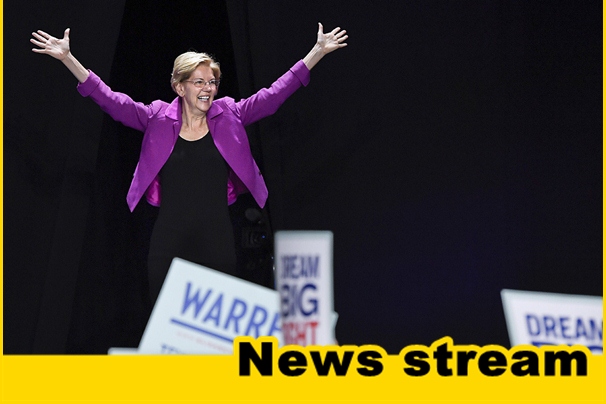
On the presidential campaign trail, Sen. Elizabeth Warren frequently boasts that she has the “biggest anti-corruption plan since Watergate.”
On Monday morning, she announced she wanted to make it a little bigger.
Ahead of speech on corruption in New York City’s Washington Square Park on Monday evening that’s expected to draw thousands, Warren unveiled additions to her plan.
“The goal of these measures is straightforward: To take power away from the wealthy and the well-connected in Washington and put it back where it belongs — in the hands of the people,” she wrote in a lengthy Medium post that combines the new proposals with the anti-corruption legislation she introduced in August 2018. “And I’m just getting started.”
Warren’s Senate office said they would be reintroducing an updated version of the bill she introduced in the previous Congress — the ‘Anti-Corruption and Public Integrity Act’ — in the “coming months.” The additions include a far-reaching ban on lobbyists from engaging in any fundraising activities, one that is likely to face legal challenges. The prohibition would apply to everything from hosting fundraisers to becoming a campaign bundler. Some of the new provisions also include banning members of Congress and other top-ranking government officials from serving on for-profit boards and requiring more disclosures for „political intelligence“ firms.
Warren will tie her New York City speech to the site of the Triangle Shirtwaist factory where a fire killed 146 people, mostly female immigrants, in 1911 because of unsafe sweatshop working conditions. The disaster provoked widespread outrage and ultimately led to sweeping labor reforms.
“The fire exposed corruption but these workers didn’t stand on the sidelines,” Warren said in a video released Sunday afternoon previewing the speech. “They fought back.” Perhaps with an eye to appealing to the many women voters who have been politically motivated in the aftermath of Donald Trump’s election, Warren added: “Big structural change: brought to you by women.”
The Massachusetts Democrats’ presidential announcement rally in Lawrence, Mass., the site of the 1912 “Bread and Roses” strike that was led by women, attempted to place her campaign in similar historical context.
Rooting out corruption has also been the centerpiece of Warren’s candidacy and key to her political identity. “The system is rigged,” has been her cri de coeur. In her 2017 book This Fight is Our Fight, Warren chided Barack Obama for not sufficiently appreciating the graft. Referencing a 2016 commencement speech in which Obama said “the system isn’t as rigged as you think,” Warren retorted: “No President Obama, the system is as rigged as we think. In fact, it’s worse than most Americans realize.”
That is why Warren has put such emphasis on her anti-corruption plan. Without it, she thinks it will be difficult to pass other far-reaching legislative goals because of the domination of lobbyists and corporate dollars in Washington policy-making.
In order to prevent people from finding ways to avoid registering as lobbyists such as becoming “consultants” or other round-about titles, Warren also calls for abolishing the so-called “20 percent rule,” which lets those who spend less than 20 percent of the time they work for a given client on lobbying avoid registering. Neil Bush, for instance, who’s the son of former President George H.W. Bush, hasn’t registered as a lobbyist despite meeting with Secretary of State Mike Pompeo and other officials on behalf of a Kuwaiti company.
There are also proposed restrictions on companies’ ability to hire former senior government officials, in an apparent attempt to crack down on former lawmakers and administration officials who advise corporate America without doing anything that would force them to register as lobbyists. Former House Speaker John Boehner, for instance, is a senior strategic adviser at the law and lobbying firm Squire Patton Boggs but has never registered to lobby.
Presidents Barack Obama and Donald Trump both placed restrictions on lobbyists entering their administration, but Warren’s proposal goes much further and would codify the restrictions in law, rather than imposing them by executive order.
The plan would also make it illegal to lobby for foreign governments, political parties and companies — a huge blow to K Street. Lobbyists registered under the Foreign Agents Registration Act who have been paid more than $1.2 billion since 2017, according to the Center for Responsive Politics. That number doesn’t include the lobbying of foreign companies such as BP and Toyota, whose lobbyists aren’t considered foreign agents.
There are some unresolved questions on the legality of Warren’s plan to ban all fundraising activities for lobbyists given recent Supreme Court rulings on campaign finance and free speech. In arguing for the provision’s constitutionality, the Warren campaign pointed a 2011 4th Circuit case, Preston v. Leake, that upheld the constitutionality of a state lobbyist contribution ban citing „important governmental interest of avoiding corruption and the appearance of corruption“ along with a fact-sheet from the liberal-group The Center for American Progress. Still, the law would likely be challenged in court which could delay implementation.
Still, Warren seems undeterred. “I believe that we can root out corruption in Washington,” she wrote. “And when I’m President, that’s exactly what I’ll do.”
By ALEX THOMPSON and THEODORIC MEYER
Source: politico.com
See more here: news365.stream





